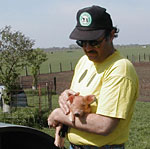By Erin Galbally
Minnesota Public Radio
June 4, 2002
A plan to restrict meat packers from owning livestock failed to make it into the final U.S. farm bill. But small farmers around the country are hopeful the amendment will have better luck on Capitol Hill this fall. Only a handful of companies now control the nation's meatpacking industry. The growing consolidation concerns family farmers. They say packer ownership depresses livestock prices and has forced more independent producers to leave the farm.
| |
|
|
|
||
For 20 years Dave Serfling has raised hogs, cattle and sheep on his farm just outside of Preston. He surveys the horizon and says livestock farming has changed a lot.
Today, very few of his neighbors own the livestock on their farms. They contract with meat packing companies and it is the companies that own the animals. Because of that, independent farmers have fewer sales options for their animals. Serfling says that means they cannot make as much off their animals.
"There were roughly five places within 12 miles of this farm to sell pigs when I started farming in 1981 and you could call different places and check each one and sell to the highest bidder," says Serfling. "Now there's only two."
Serfling says small farmers are being squeezed out of the countryside by the increasingly powerful meatpacking conglomerate. That made Serfling sign on in support of legislation in the farm bill to prohibit corporate ownership of livestock.
Serfling called farmers all over the Midwest encouraging them to lobby on behalf of the legislation that would have let companies own livestock, only for the two weeks before they're slaughtered. The legislation passed through the Senate but never made it to the floor of the House.
|
"Let's find out clearly what the problem is before we jump off the bridge with some very destructive legislation. "
- Sara Lilygren, lobbyist for meatpacking industry. |
Serfling hopes the ban on corporate livestock ownership will be resurrected in the fall.
"We think in the long run it's going to benefit society and in the short run it's probably going to mean a little higher prices for consumers but we think it's worth it," he explains.
Not surprisingly the meatpacking industry strongly opposes the legislation.
Sara Lilygren works for the American Meat Institute, the largest and oldest meatpacking lobbying organization. Lilygren says there's no reason packers should be targeted with restrictions. Like many other industries the meatpacking industry is interested in owning its products from start to finish. Lilygren says moreover, there's no proof that packer ownership of livestock is a bad thing.
"We say if there's a problem, let's find out clearly what the problem is before we jump off the bridge with some very destructive legislation and mandates that would cause huge property losses for decent people across the country," says Lilygren.
Meatpacking companies would have to sell off animals they currently have under contract. Many in the industry argue a ban on company owned livestock could kill plans for any new meatpacking plants. It could even spell the end for existing plants.
| |
|
|
|
||
The world's largest hog producer and processor made that clear in Sioux Falls earlier this year. Smithfield Foods took out a full-page ad in the local paper threatening to shut down a plant if the federal legislation made it though. The Sioux Falls plant employs more than 3,000 people.
Neil Harl, an economics professor at Iowa State University, co-authored a study on packer ownership. He says consolidation hurts the small farmer but it also hurts the consumer. Harl says that wasn't always the case, but today's trend should be reason enough to impose a federal mandate.
"The numbers began to turn in a different direction in the mid 90's indicating that concentration probably was responsible for those benefits not being passed on but going to the bottom line of the packer," says Harl.
Harl says now consumers and independent farmers are paying the price. He says federal regulation of livestock ownership would help spread the benefits around.
The issue is expected to return Capitol Hill this fall. Many predict it will become a campaign issue in the November elections. It's already made its way into Minnesota's U.S. Senate race. DFL incumbent Paul Wellstone strongly favors restricting corporate ownership of livestock. As a result his challenger Norm Coleman secured campaign contributions from at least one meat industry group.


